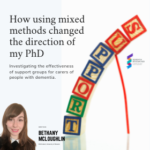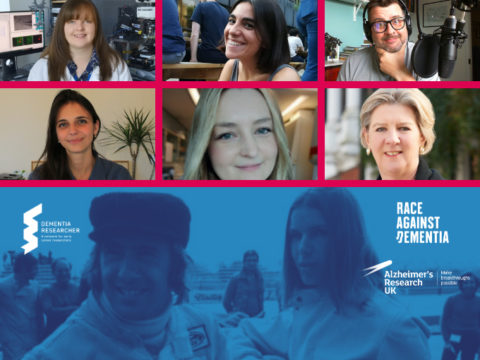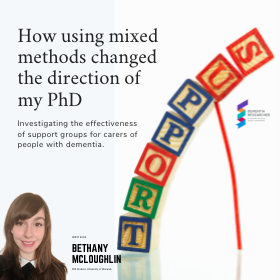
Bethany McLoughlin
Name:
Bethany McLoughlin
Job title:
PhD Student
Place of work / study:
University of Warwick
Area of Research:
Health Sciences
How is your work funded?
ESRC Scholarship
Tell us about your career path to becoming an early career researcher.
I studied Experimental Psychology at the University of Bristol, and in my last year I took an ageing psychology module that inspired me to become a dementia researcher. From there, I completed a master’s degree in Dementia Neuroscience at UCL, and this year I started an ESRC funded PhD at the University of Warwick in Health Sciences.
What does your research focus on?
My research focuses on support groups for carers of people with dementia. My primary aim is to compare the effectiveness and accessibility of online and face-to-face support groups and to explore the pros and cons of each approach. I am interested to learn about the influence of COVID-19 on support groups, and plan to complete a mixed methods study over the course of this year investigating carers and facilitator’s experiences of moving support groups online during the pandemic.
Do you have any advice for someone looking to embark on a career in dementia research?
If you’re hoping to do a PhD, I recommend setting up alerts for funded PhD projects on findaphd.com and also checking the jobs section of dementia researcher regularly to find out about new opportunities. Keep in mind that there is a lot of competition for PhD positions and you might have to apply for a lot before you’re successful, hang in there!
What are the best bits about being an ECR?
For me it’s getting to design my own research project and getting to do the research that I’m most passionate about whilst still receiving support and guidance from senior academics and having lots of training and learning opportunities.
What do you see as the main challenges?
At this time I am worried that the pandemic will make my original research question impossible to investigate as it would currently be unsafe to conduct face-to-face support groups. This leaves a degree of uncertainty about whether I will need to make changes to my original proposal and makes the project difficult to plan ahead of time. The pandemic also means that I’ll be working from home where the main challenge is not eating biscuits all day (equally troubling).
What do you write about?
I am documenting my experience of studying for my PhD, discussing life, research and studies. Hoping to encourage other people to enter a career in the field, sharing some lessons I learn along the way.
Tell us a fun fact about yourself:
I lived in Japan for two years and made brief appearances on Kyushu’s local TV station.
Why did you choose to work in dementia?
I always knew that I wanted to be a researcher but I was interested in pretty much all areas of psychology and I didn’t know what to focus on after I finished my undergraduate degree. That completely changed when I attended a lecture about dementia as part of an ageing psychology module. I decided right there and then that I wanted my career to be dedicated to improving the lives of people with dementia. I am particularly passionate about interventions for carers of people with dementia after speaking to many carers who believed that they had lack of support and felt isolated and overwhelmed as a result of their caring role. I hope that my PhD project can be used to help improve services for dementia carers.

 Print This Post
Print This Post







